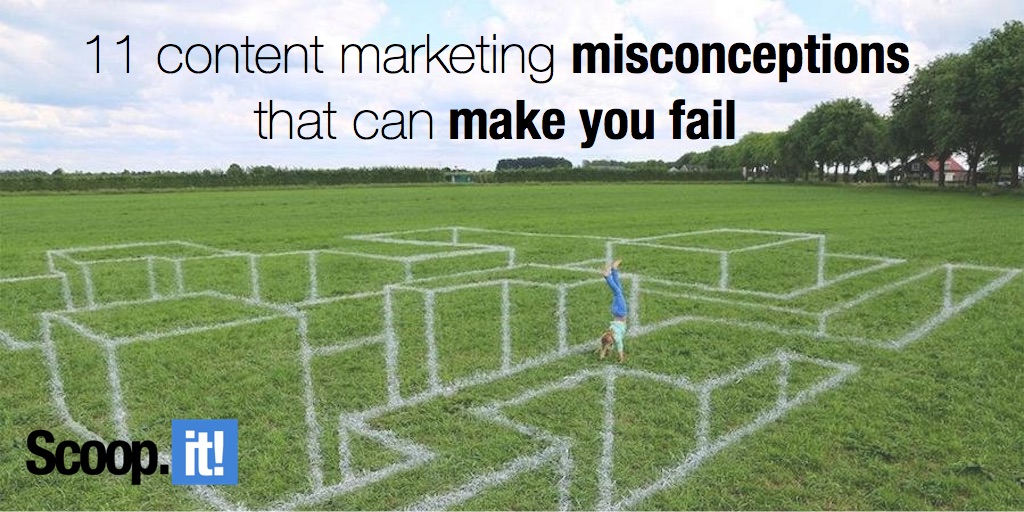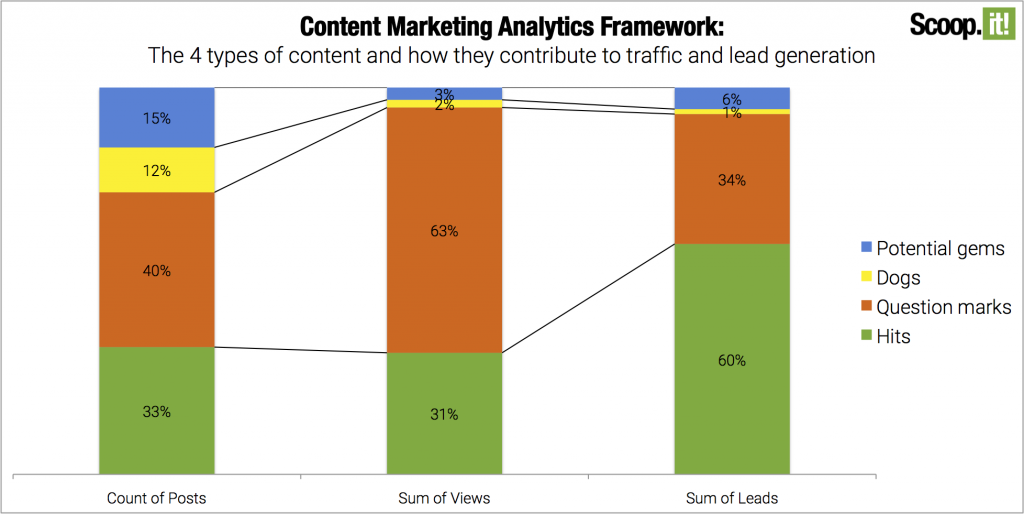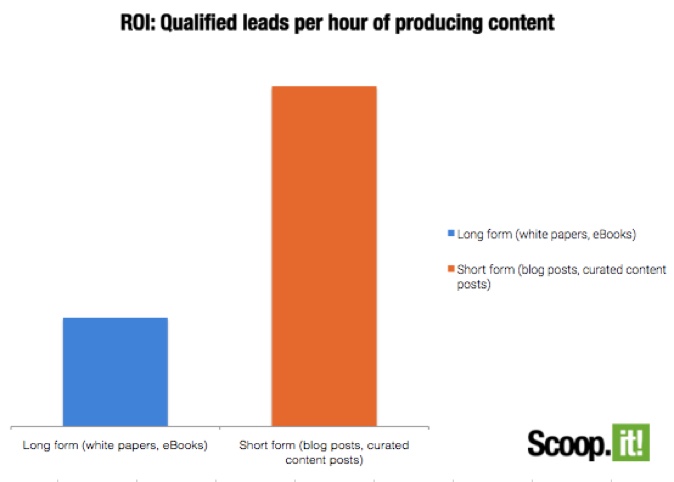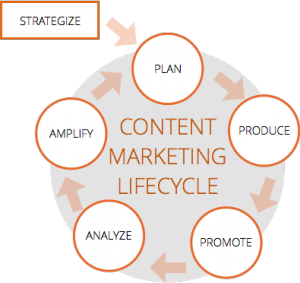
According to CMI’s 2016 benchmark report, only 30% of B2B marketers say their organizations are effective at content marketing.
It’s no secret that content marketing has become standard practice for businesses today. Yet many marketers still struggle with how to do it effectively. With content marketing’s rise in popularity has come a slew of false assumptions that are detrimental to success. It’s time to put these to rest once and for all. Here are 11 of the biggest content marketing misconceptions you need to avoid:
1. Content marketing delivers immediate results
Reality: creating exceptional, winning content takes time, and seeing results from it takes even longer.
In an ideal world, we’d all see immediate results from our efforts. Thus, it’s understandable that when we invest time and effort into something, we’d like to see results as soon as possible. Unfortunately, most things in life don’t work that way. Content marketing is no different, and as with any skill or school subject, requires patience and practice to learn and master. Being successful with content marketing requires patience- it’s about building relationships and credibility with your online community, which can take time.
Myth-busting tip: make it a priority to set tangible benchmarks and realistic deadlines for when you expect an ROI from your content efforts.
2. Content marketing is hidden advertising
Reality: effective content marketing is about your audience, not your brand.
 A surefire way to fail quickly with content marketing is by being overtly promotional. Your audience isn’t stupid, and if your content is impersonal, irrelevant and self-promoting, they’ll be turned off fast. One of the core tenets of content marketing is that your audience comes first. A successful content marketing strategy is built on a solid foundation that aligns the needs of your audience with those of your overall business goals. Rather than promote your product, your content should be directly relevant to the needs of your audience and informative.
A surefire way to fail quickly with content marketing is by being overtly promotional. Your audience isn’t stupid, and if your content is impersonal, irrelevant and self-promoting, they’ll be turned off fast. One of the core tenets of content marketing is that your audience comes first. A successful content marketing strategy is built on a solid foundation that aligns the needs of your audience with those of your overall business goals. Rather than promote your product, your content should be directly relevant to the needs of your audience and informative.
Myth-busting tip: Observe the 80/20 rule, which suggests that 80% of the content you create should be audience-centric and focused on the needs and biggest challenges of your customers. The other 20% should be about your product or brand. However literally you choose to interpret this, a good rule of thumb is to create value-driven content.
3. It’s not possible to measure content marketing ROI
Reality: au contraire. Content marketing ROI can be measured, the problem is just that most marketers don’t know how to go about measuring it.
Most marketers today struggle with how to prove concrete ROI from their content marketing, and over 56% admit either failing or lacking clarity entirely on whether they are successful or not. This is because most marketers don’t have a system in place that allows them to effectively measure, track and analyze their content performance. Content marketing ROI is very much measurable with the right metrics in place around which to measure success:
Myth-busting tip: using a simple analytics framework like the one above, you can easily measure the impact of your content marketing on ROI and see how much revenue is being generated from your content marketing efforts. You can use tools to help you monitor your content marketing analytics on a post-by-post basis to ensure you are on track to generating positive ROI.
4. The more content you publish, the more successful you will be (quantity > quality)
Reality: more does not equal better. Nor does it ensure content marketing success. Just as you can’t rely on creating a few epic, high-quality pieces of content and expect to succeed, you can’t veer off to the other end of the spectrum and assume that content marketing success is about quantity.
According to content marketing expert Kristina Halvorson, “More content is perceived as more selling opportunities, more user engagement, more help, more everything. But that’s rarely the case. Content is more or less worthless unless it […] supports a key business objective [or] fulfills your user’s needs.”
Creating a lot of content and publishing it as frequently as possible is not the key to success. Content marketing is about helping your audience, not drowning them in a sea of digital noise. Even if your content is of high-quality, publishing constantly on your blog or social channels runs the risk of annoying your audience and a rapid decline in engagement.
Myth-busting tip: you need to find a middle ground between content quantity and quality. Every company is different depending on your budget and business goals, but you need to find a balance.
5. It’s about being on every social media platform at the same time
Reality: it’s about knowing your audience, listening to them and communicating with them where they are.
The fomo effect is diluting your power! Effective content marketing is about more than being omnipresent across as many social channels as possible. It’s about understanding the behaviors of your audience and how they prefer to engage using those specific channels to communicate them. You need to focus on where your audience is looking for answers to their questions and are most susceptible to listen to what you have to say.
Myth-busting tip: leverage automation to maintain a presence.
6. Content marketing is too expensive
Reality: content marketing is much less expensive if you apply lean content marketing techniques and use the right tools to maximize efficiency.

While there tends to be a high cost associated with the effort required to create great content, there are plenty of lean content marketing strategies you can use to maximize your efficiency while minimizing costs. One highly effective lean method is re-purposing your content.
Myth-busting tip: Use lean content marketing techniques to scale your content marketing efforts without using more resources.
7. Good content marketing is about creating a few epic pieces of content
Reality: while creating quality content is good, you can’t bet all you have on a few big pieces.
Success with content marketing doesn’t come from taking days or weeks to create a few strong long-form pieces of content (whitepapers, eBooks, etc.) and relying on them to generate massive amount of leads every month or quarter. You need to regularly produce blog posts, curated content, and other short-form pieces of content for a dynamic blog that can effectively generate a few leads every day.
Myth-busting tip: repurpose short-form content into long-form content or vice versa. For example, transform a few blog posts into an eBook, or split a massive piece of content into smaller pieces. Reformatting your content is a powerful lean content marketing technique that lowers overall costs and allows you to just about have the best of both worlds.
8. Lots of traffic and shares = content marketing success
Reality: engagement metrics aren’t always an accurate barometer for success, and they don’t necessarily prove a business outcome.
According to The Fournaise Marketing Group, 76% of marketers use the wrong KPIs and metrics to assess the effectiveness of their strategies. Don’t be deceived by vanity metrics. Metrics such as shares, retweets and views are often the easiest and most obvious to collect, yet they can be misleading and unreliable when evaluating the impact of your content on ROI.
Myth-busting tip: make sure you know exactly what you are measuring when evaluating the performance of your content. Identify which specific KPIs to measure and use a content marketing analytics framework like this to help you monitor your results and stay on track.
9. It’s about sharing good content on social media
Reality: this is partially true, but you won’t achieve success with content marketing if your content home is built on rented land.

While it may be tempting to ditch your blog entirely to publish on alternative platforms like Medium or LinkedIn and promote on social media channels, you’ll miss out on the compounding SEO traffic and fail to convert potential customers. While leveraging other publishing platforms is a good strategy for boosting visibility, chances are you can’t live off of brand awareness alone. Especially in a time where organic reach is declining steadily.
Myth-busting tip: produce content for your own site and create social posts promoting it with links back to your blog/website to drive traffic and generate leads through gated content.
10. Content marketing is just about creating great content
Reality: good content isn’t enough to succeed on its own. While producing great content is an essential phase of the content marketing lifecycle, you need to optimize all the phases in order to succeed. You can’t simply hit publish and pray your content will perform. While creating good, high-quality content is important, it’s not sufficient without proper promotion to ensure it gets in front of the audience you intended it for. You have to create some mediocre content to learn how to produce great content. Even if you create a digital Shakespearean masterpiece, you can’t expect your content to magically reach your audience all on its own without a little help.
According to Marcus Sheridan:
Myth-busting tip: use tools that help you to automate distribution and allow you to easily re-share your content multiple times across your social channels to ensure maximum impact for each piece of content you create.
11. Once you write it, you’re done
Reality: content marketing is a lifecycle that requires optimization at every phase in order to succeed.
One of the biggest misconceptions with content marketing today is that it has a finish line. While it’s tempting to hit publish and move on, successful content marketing is an ongoing process that never ends.
Creating great content is challenging, yet it’s only the tip of the iceberg. Effective content marketing is about strategizing, planning, producing, promoting, analyzing, amplifying, and repeating the phases in an ongoing, continually evolving process. In order to succeed, you need to optimize every phase of the content marketing lifecycle:
Myth-busting tip: think of content marketing as a full lifecycle and make sure to optimize every phase.
Work smarter with content marketing intelligence
By leveraging technology and content marketing intelligence, you can optimize your efforts in every phase to ensure you reach your goals and deadlines.
Over to you
Now it’s your turn. Have any content marketing misconceptions you’d like to share? Feel free to let us know in the comments below. We’d love to hear from you.
If you want to get 30 effective techniques to master content marketing along with valuable insights from 10+ influencers like Mark Schaefer, Rebecca Lieb, Lee Odden, Jason Miller or Ian Cleary, download our free eBook now!
Image by Linkbeef







You are spot on!